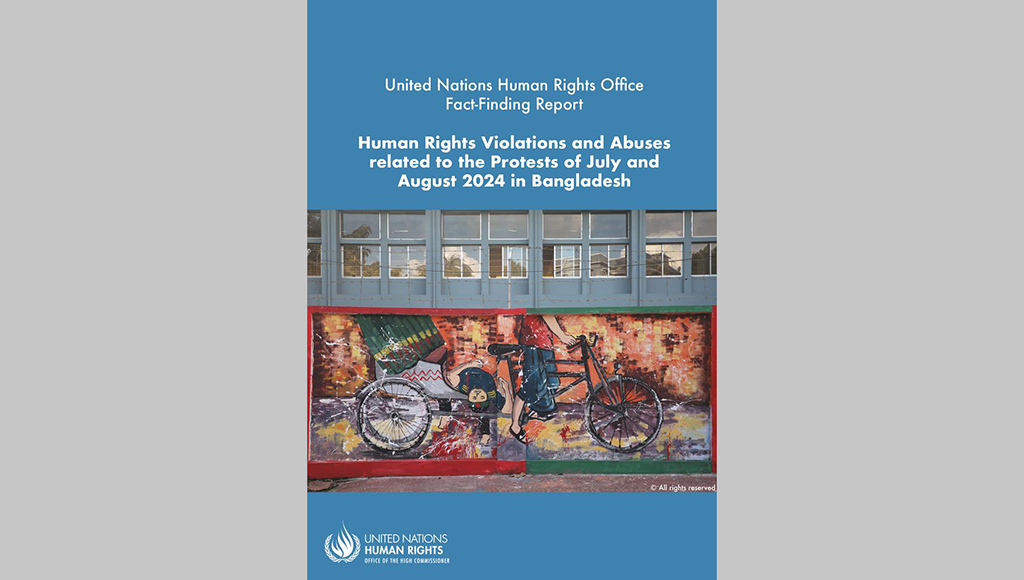
THE much-awaited fact-finding report of the UN Office of the High Commissioner for Human Rights, OHCHR, on the Protests of July and August 2024 in Bangladesh has been seen as instrumental in resolving many debates related to accountability and justice for the human rights violations from July 1 to August 15, 2024. Though all human rights violations may not lead to criminal prosecution, the OHCHR Report indicated the ‘widespread and systematic attack against protesters and other civilians’ that took place during the aforementioned period may meet the threshold of crimes against humanity, thus warranting further criminal investigation by a competent authority.
Following the publication of the report, the OHCHR chief, Volker Türk, commented that there should be criminal prosecution of those involved in the commission of crimes against humanity before a domestic tribunal, the International Criminal Court, or courts exercising universal jurisdiction. On the other hand, the chief prosecutor of the International Crimes Tribunal-Bangladesh (ICT-BD), Muhammad Tajul Islam, commented that this report will be used as ‘irrefutable evidence for crimes against humanity.’ Hence, the criminal justice implications of the OHCHR Report warrant a detailed analysis.
Globally, the reports produced by UN fact-finding missions have been frequently used by UN ad hoc tribunals, the International Criminal Court, and even domestic tribunals. The International Court of Justice has also taken note of the evidence recorded in such reports. This can be illustrated by the two reports of the Independent International Fact-Finding Mission on Myanmar (IIFFMM). Both the ICC and the ICJ admitted the evidence of the reports produced by the IIFFMM. However, the evidence contained in these reports was used for preliminary proceedings in both courts, leaving their admissibility in final proceedings subject to further scrutiny. The main reason for the varying weight of these reports in different stages of proceedings is the distinct evidentiary standard used by the UN investigative mechanisms.
The UN investigative bodies have almost consistently adopted the ‘reasonable grounds to believe’ standard. According to the IIFFMM 2018 Report, a piece of evidence is considered to have met this standard when ‘a sufficient and reliable body of primary information, consistent with other information, would allow an ordinarily prudent person to reasonably conclude that a case, incident, or pattern of conduct occurred.’ The OHCHR Report further clarified that this standard is lower than the ‘beyond reasonable doubt’ standard used in the criminal justice system. Hence, it recommended that the government of Bangladesh conduct further investigation through competent authorities into the alleged international and domestic crimes.
This does not imply that the OHCHR Report lacks consequences for criminal trials against the perpetrators of the July massacre. Though the evidence is not sufficient for securing a final conviction, it is undoubtedly adequate for issuing arrest warrants and framing charges. The ICC has used UN reports as a basis for issuing arrest warrants on several occasions. Taking note of the ICC’s experience, Bangladesh can move forward with the initiation of proceedings related to the event and the individuals referred to in this report, if it has not already done so. The ICT-BD chief prosecutor has also stated that there is ‘no basic difference between the OHCHR Report and the evidence found in the probe of the ICT investigation agency.’
The OHCHR Report is also relevant for five key criminal justice issues: (i) extradition, (ii) abolition of the death penalty, (iii) amendment of the ICT-BD, (iv) the relevance of the ICC, and (v) universal jurisdiction. Each of these issues merits a detailed explanation.
First, the extradition process generally requires strong evidence to support criminal charges against the individual whose extradition is sought. In this case, the OHCHR Report provides high-standard evidence. Given the changing circumstances following the publication of the OHCHR Report, it will be pertinent for the government of Bangladesh to request the extradition of those accused of committing crimes in the context of the July massacre. Bangladesh has already submitted the necessary documents for Hasina’s extradition request, which was made last December, on February 13, 2025. It is expected that the submitted documents include the OHCHR Report. It remains to be seen how India will react now that it has the required evidence at its disposal.
Second, the OHCHR Report recommended the abolition of the death penalty, especially in the context of the ICT-BD. It also mentioned that the OHCHR cannot support any criminal justice processes that permit capital punishment and raise serious human rights concerns. While Bangladesh’s existing human rights obligations do not prevent it from imposing the death penalty, the UN has repeatedly urged it to reconsider its position. On the other hand, there are growing concerns regarding the effectiveness of the death penalty in the context of transitional justice. Hence, Bangladesh will likely continue facing this issue in the near future.
Third, the OHCHR Report raised its concerns over fair trial standards and other human rights issues in certain provisions of the International Crimes (Tribunals) Act, 1973 (ICT Act), despite significant amendments made in November 2024. These amendments addressed human rights concerns over the ICT Act that had been raised by the OHCHR and some human rights organisations. Regarding the remaining human rights concerns, the government of Bangladesh, as per the OHCHR Report, has expressed its interest in making further amendments, if necessary. The provision allowing trial in absentia in the ICT Act is seen as the most controversial aspect of the law. This has previously been criticised by the UK Supreme Court for its apparent incompatibility with international human rights standards. It remains to be seen whether the government of Bangladesh will amend this provision after the OHCHR Report’s findings.
Fourth, the OHCHR Report also discusses the possibility of prosecution before the ICC. Volker Türk also raised this issue. However, given that the ICT-BD is already conducting trials of the individuals responsible for the July massacre, the ICC, under the principle of complementarity, is not in a position to exercise jurisdiction over this situation. This principle dictates that the ICC can exercise its jurisdiction only if a state is unable or unwilling to investigate or prosecute international crimes. At this stage, the ICC serves as a reminder to the ICT-BD that failure to uphold its mandate could lead to ICC intervention. Given the OHCHR Report’s evidentiary standard and its findings on crimes against humanity, it is clear that this report is adequate to convince the ICC to consider initiating an investigation. Consequently, any change of policy by any subsequent government regarding the trials of the July massacre will prompt the ICC to take the July massacre situation into its jurisdictional ambit solely on the basis of the OHCHR Report.
Finally, Volker Türk has also mentioned the possibility of applying universal jurisdiction to prosecute individuals who are currently seeking refuge abroad. Generally, a state can exercise its criminal jurisdiction over crimes committed within its territory (territorial principle), by its citizen (active personality principle), or against its citizen (passive personality principle). Under the principle of universal jurisdiction, however, a state may prosecute individuals accused of international crimes regardless of any direct connection to the crime. Currently, 145 states have universal jurisdiction laws covering at least one of the four core international crimes. The Bangladesh government should identify individuals implicated in the OHCHR Report who are currently residing in countries with universal jurisdiction laws and engage with their governments to facilitate legal action. Civil society organisations can also play a role in this process.
Despite the Bangladesh Awami League leadership’s persistent denial of responsibility for the July massacre, the OHCHR Report represents a significant step towards ensuring a transparent accountability process. At the same time, it introduces substantial challenges that must be addressed to establish a universally accepted criminal trial process. Moving forward, it is imperative that the government of Bangladesh take the OHCHR Report’s criminal justice recommendations seriously and take appropriate action to ensure accountability for the crimes committed during this period.
Quazi Omar Foysal is a lecturer at American International University-Bangladesh and an advocate at the Supreme Court of Bangladesh.
This post was originally published on this site be sure to check out more of their content.









